As of now, Azad couldn't be in the BJP leadership's calculus.
The BJP has been trying to drill into the J&K electorate that this time around the UT would most certainly have a Hindu chief minister, explains Mohammad Sayeed Malik, the distinguished commentator on Kashmir affairs.
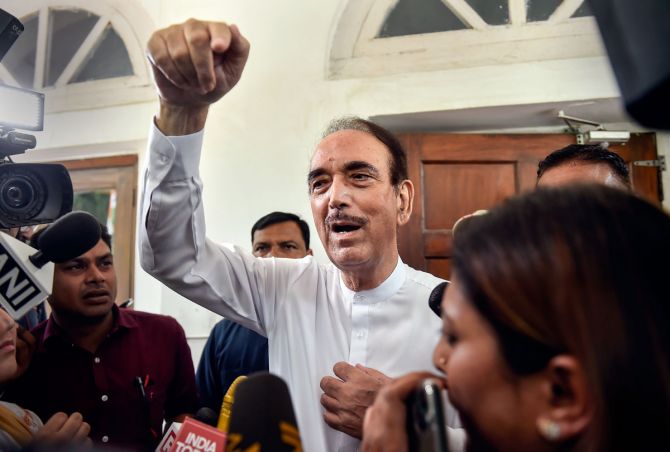
Thanks to certain inherent 'deformities' in the complicated political format of his home state, Jammu and Kashmir, Ghulam Nabi Azad's national level big bang resignation from the Congress party created comparatively a milder tremor in the Kashmir Valley that has either passed or is about to pass.
Post-August 5, 2019 state politics, in general, and that in the volatile Kashmir Valley in particular, remains beset with large-than-life local issues across the board.
The political playfield bristles with profound uncertainties for everyone.
Looking from here, Azad's profile within state politics, with whatever projections it came to acquire over the past half a century, was looked at only through the Congress prism.
Since that dramatic moment on the floor of the Rajya Sabha on February 9, 2021, a week ahead of Azad's retirement as leader of the Opposition in the House, when Prime Minister Narendra Modi was seen in uncharacteristic emotional mode, Azad's position had been rendered ambiguous on the latter's home ground.
Announcement of his formal resignation from the Congress with a resounding parting kick has largely demarcated his likely position in state politics.
In quantitative terms, however, its magnitude is unclear at the moment.
Azad's 'personal' factor within the local arena is going to take some time to reveal its net worth.
To start with, so far only a negligible number of local Congressmen have stood up to be counted with him while the larger party apparatus remains intact -- behind the 'Gandhis'.
It is somewhat enigmatic that Azad's high profile national-level image over such a long period did not match the measure of his prowess on his home ground whenever it came to testing it in a real combat.
He had to wait till 2006 to contest -- and win -- an assembly by-election that too till after he had taken over as the chief minister from the PDP's Mufti Mohammad Sayeed in November 2005 under their power-sharing arrangement.
That seat was vacated for him by one of his family members.
In the only other election that Azad contested from J&K, in the 2014 general election, from the Udhampur Lok Sabha constituency he was defeated by the BJP's Dr Jitendra Singh by a large margin.
However, now Azad would be entering the arena in a different capacity.
Whether the old yardstick still holds good to assess his real worth or he is able to come up with something substantially different only the time can tell. It is yet too early to even make any credible guess.
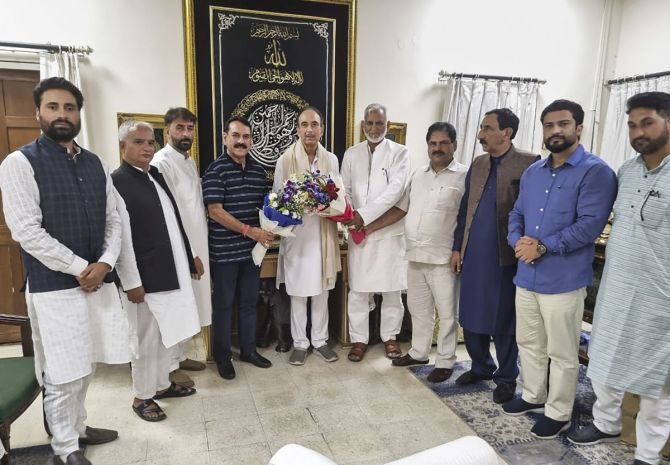
Azad's immense personal goodwill could be a potent factor in shaping his future course of action on the ground.
But the irony is that the course of state politics today is too foggy to look ahead with certainty.
That Azad was able to snatch a Rajya Sabha seat in 2015 on a Congress ticket even though the rival PDP-BJP alliance was in command in the state legislature showed the potency of his 'personal factor'.
And it is, again, this very factor that could have produce leverage in shaping the new line up when chips are down.
In plain language, much would depend on how and to what extent Azad is able to rally behind him a reckonable force that eventually has to come from the Congress with possibility of also attracting a few 'splinters' from the two main regional parties -- the National Conference and the Peoples Democratic Party who at the moment share their common umbrella -- the Gupkar Alliance.
Poaching got a significant fillip since August 5, 2019.
But, going by its end result, like the murky outcome of district level boards, poaching has turned to be a low-yielding venture, until, of course, post-poll machinations take care of that factor.
Traditionally, state politics has remained vulnerable to 'exigencies' of national politics in the border (erstwhile) state.
Nobody would know it better than Azad whose nearly half a century long political life has been spent in New Delhi's corridors of power.
After the recent delimitation of assembly constituencies in J&K the demographic calculus has been turned upon its head.
Most of the old precedents have either been rendered obsolete or have simply got erased in the process.
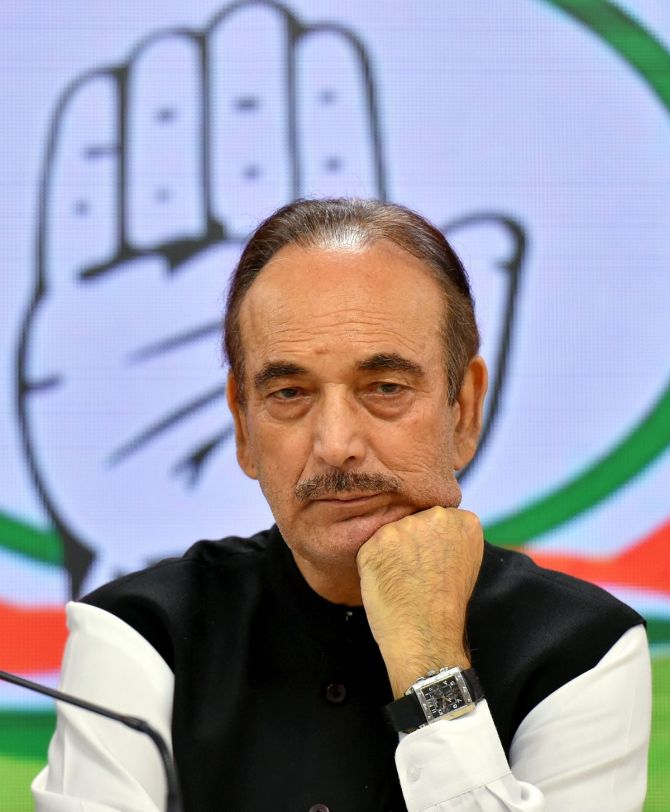
Looking from that crucial angle, if, when and how Azad chooses to take the inevitable plunge it is certainly going to matter both, qualitatively as well as quantitatively.
That much also evident from the timing of his resignation from the Congress and the biting content of his resignation letter.
Obviously, the event appears to have been timed perfectly.
State politics is in flux, the rudderless Congress at the national level is in disarray and the past political agenda of the state politics has been literally buried.
The mainstream slot in the Valley's politics has been the doldrums for the past three years.
The only thing which one could say at this moment with certain amount of certainty is that the state chief minister's slot is not open to anyone -- not excluding Azad -- other than the BJP's own person.
Otherwise, the logic of all that happened on and after August 5, 2019 becomes meaningless.
It is for this reason that the state assembly polls almost decided to be held this year-end after all sorts of gerrymandering by the Delimitation Commission have been put off indefinitely.
The permutation and combination process, somehow, does not seem to have been reassuring enough for the BJP that its chief minister in the chair could be taken for granted even after geographically illogical composition of assembly constituencies.
The 'Azad factor' could be of considerable help in that direction.
As far as I can see, as of now, Azad couldn't be in the BJP leadership's calculus on this particular point.
From top to bottom, the BJP has been trying to drill into the ears and minds of the J&K electorate that this time around the UT would most certainly have a Hindu chief minister.
Azad has the potential to nibble at the voting base of the Gupkar Alliance parties, mainly the NC and PDP, as he is believed to be having personal influence in quite a few of areas mainly in Muslim-majority segments in the Jammu region.
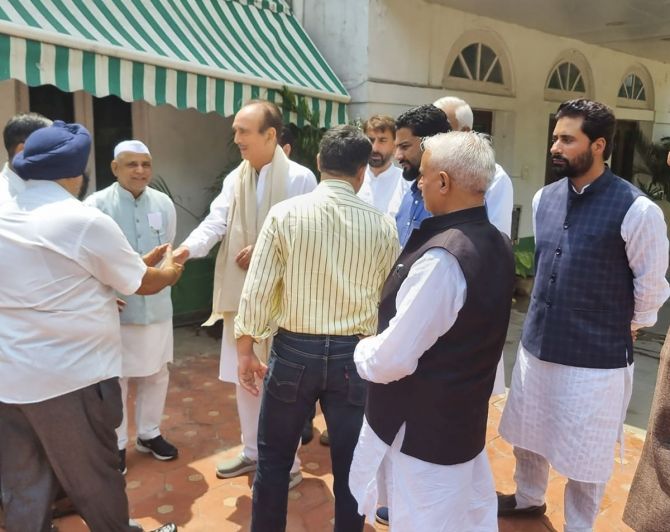
The logic of Kashmir politics being what it has been, one couldn't predict with certainty if and to what extent the Azad factor could upset the Gupkar applecart.
Reason being that post-2019 old calculus has gone with the wind.
At least in the Valley, the mainstream parties are generally being looked upon as the best bet in the worst ever bargain.
The visible signs of distinction between pro-Accession and anti-Accession camps have disappeared.
The predominant sentiment on the ground more or less corresponds to the vibes emerging out of the beleaguered Gupkar Alliance.
And it is here that the real worth of the 'Azad factor' would ultimately be tested.
Those familiar with subterranean layers of Kashmir politics would say it is easier said than done.
Feature Presentation: Aslam Hunani/Rediff.com




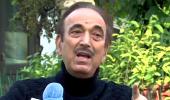






 © 2025
© 2025